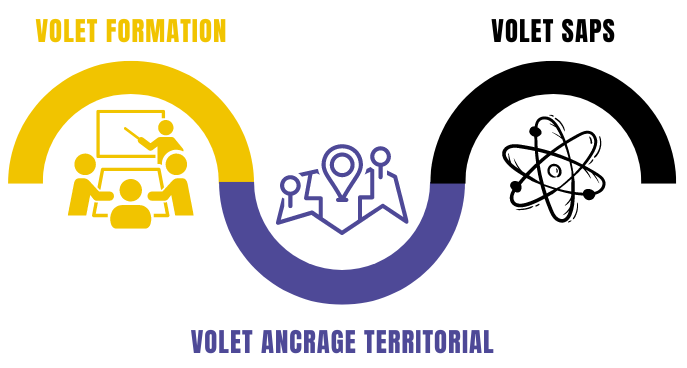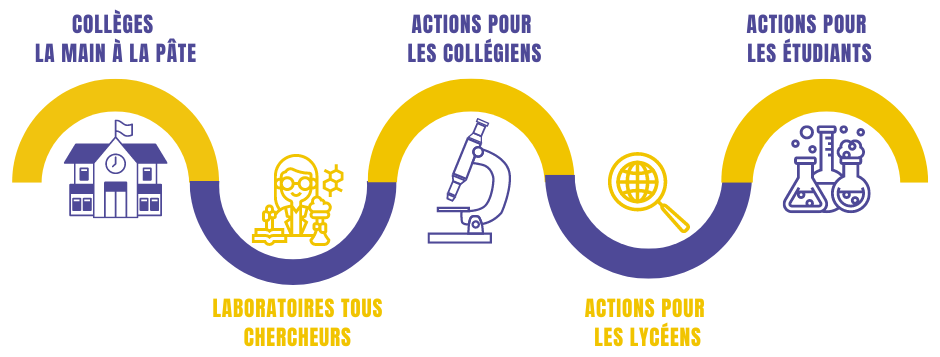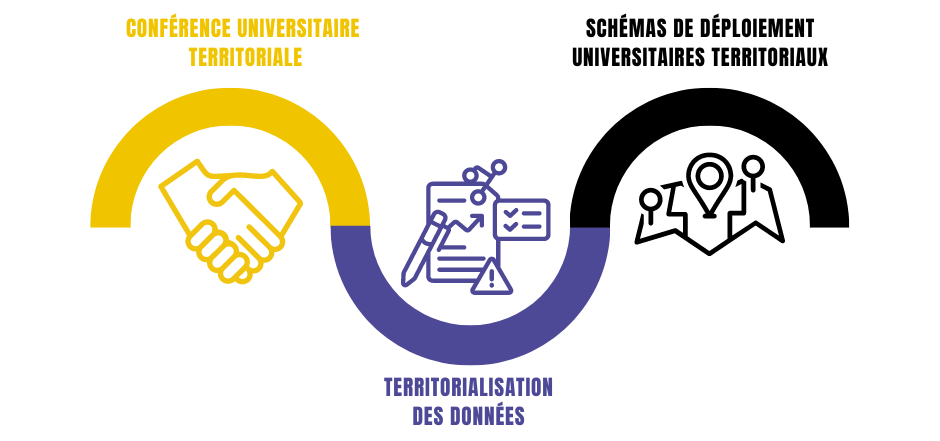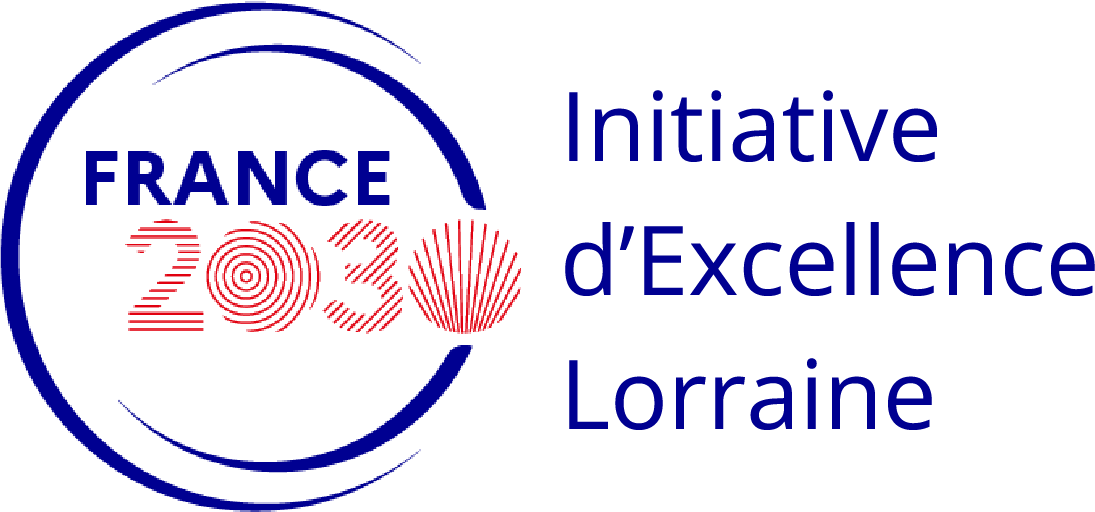Support the necessary developments in undergraduate education and strengthen the territorial dimension of the University of Lorraine.
In 2022, the Education and Territories program was announced as a winner of the “ExcellencES in All Its Forms” call for projects, Wave 2 of the Future Investment Program (France 2030), with support of €15.6 million over 8 years. Education and Territories (E&T) complements and brings together the numerous transformation programs already partially underway at the University by ensuring overall coherence across the Lorraine ecosystem. The aim is to strengthen our I-SITE LUE signature by acting both internally on student education, particularly at the undergraduate level, and externally toward the territories. Education & Territories comprises three action components: the Training Component, the Territorial Anchoring Component, and the Science With and For Society (SAPS) Component. These components operate systemically by combining various initiatives and transformation actions of the University of Lorraine and the Lorraine campus.

Scientific Lead: Nicolas OGET – nicolas.oget@univ-lorraine.fr
Operational Project Manager: Daphné CRÉPIN – daphne.crepin@univ-lorraine.fr
The Education and Territories program receives state funding managed by the National Research Agency under France 2030, with the reference “ANR-22-EXES-0002.”
Training Component
The Training Component aims to enhance student success by preparing them to become the citizens and professionals of tomorrow, equipped to support the major transitions of the 21st century and to adapt to the rapidly changing job market. Several initiatives are planned to achieve this goal.

Implementation of personalized tracks in the Bachelor’s program
These paths have three main objectives: student success, acquiring additional skills beyond one’s disciplinary orientation, and gradually building a personal and professional path. From the 2024 academic year, pathways will be available from the first year:
- Health Access License (LAS)
- Primary School Teaching (PE).
The institution will also offer pathways for second-year students, accounting for 3 ECTS per semester.
- ORION (Dare Research): This path allows students to discover and practice research, experiment with critical thinking, explore a subject, and engage with scientific controversies.
- Discovering Entrepreneurship: As the first entrepreneurial French university with PeeL (Lorraine Student Entrepreneurship Hub), this path raises awareness of entrepreneurship in its various forms. Students explore main theoretical orientations, identify key stakeholders, and try entrepreneurship through group work.
- ESHN: This path values skills acquired by high-level athletes (list 1) in their practice, while preserving their educational pathway.
- AGILES (Act for Environment and Society): A pathway focused on developing interdisciplinary skills related to Social and Environmental Responsibility (RSE) to contribute to an ecological and inclusive transition, as well as Equality-Diversity-Inclusion.
In addition to these pathways, the university will implement a SENSE module (Understanding Societal and Environmental Issues) for all new entrants at UL to familiarize them with key environmental challenges (energy and climate issues, biodiversity issues), societal challenges, and issues related to Equality, Diversity, and Inclusion (EDI).
Support for programs and bridges between curricula
Student projects can evolve and require reorientation, particularly to facilitate continued study or professional integration. The aim is to promote bridges between programs, allow acquisition of complementary skills, and support hybrid pathways. Bridges between first-cycle programs will be developed alongside continued study opportunities.
Submission of dossiers is open until April 3, 2025.
A response will be provided starting May 7, 2025.
Thematic networks: 6 LUE challenges
Six sectoral Thematic Networks will be established, corresponding to the 6 LUE challenges:
1. 21st Century Materials Challenges,
2. Energy Transition,
3. Ecological Transition (One Earth),
4. Digital Transition of Industry and Society,
5. Societal Transition,
6. Global Health Challenges in the 21st Century.
The Thematic Networks, composed of researchers, students, companies, and local authority representatives, aim primarily to improve the quality of education. Their mission is to identify areas for improvement, ensure high-level training consistent with European and international standards, and promote alignment of programs with professional integration contexts and societal and socio-economic needs.
Territorial deployment of the Training Offer
In connection with the AILES project, Education and Territories aims to facilitate high school students’ access to higher education by raising awareness of the University and ensuring appropriate territorial coverage of the training offer in Lorraine. The goal is to guarantee the University’s public service missions, in proximity and coordination with the territories hosting these programs.
Transformation of training support
The objective is to allow researchers to devote more time to their main missions by transforming and developing support for undergraduate training. Strengthening the teams will also involve recruiting training assistants.
Scientific Lead: Nicolas OGET nicolas.oget@univ-lorraine.fr
Operational Training Project Manager: Julidé KARA julide.kara@univ-lorraine.fr
SAPS Section
Our students and future students are the citizens and future professionals of our society. This is why Education and Territories aims to target them primarily through a program of actions dedicated to scientific culture. The restructuring of the undergraduate curriculum represents an opportunity to integrate SAPS actions both before and during higher education studies.
The goal is for every student and prospective student in the region to have the opportunity to meet researchers, PhD students, and science outreach professionals, as well as to reflect on science/society topics while training and considering their academic orientation. Training in scientific methodology is a key challenge for these audiences. This Education and Territories initiative dedicated to Science With and For Society actions for school and university audiences complements other SAPS initiatives.

Actions implemented through the SAPS Section
- Creation of 20 new La main à la pâte (LAMAP) Colleges in rural areas or regions far from major cities, managed by the Maison Pour La Science (MPLS).
- Research methodology training for middle and high school students with the revival of the “Tous Chercheurs” Laboratory in Metz, a participatory science and research education program managed by INRAE Nancy Grand-Est.
- Development of a company and laboratory immersion program for 8th and 9th grade students to encourage discovery of scientific careers, managed by MPLS.
- Strengthening interactions between digital science researchers and high school classes through the 1 researcher – 1 class: Chiche! initiative, managed by INRIA.
- Implementation of a program dedicated to students in their living environments, closely linked to societal concerns related to science: scientific socials, meetings with PhD students and researchers. This includes collaborative work with student associations, the Orion program, and student life actors, managed by the University of Lorraine.
Political Lead: Jean-Paul ROSSIGNON jean-paul.rossignon@univ-lorraine.fr
Operational SAPS Project Manager: Julie ADAM julie.adam@univ-lorraine.fr
Territorial Anchoring section
The University of Lorraine is present in four departments, two metropolitan areas, and twelve communities of municipalities.
The aim is to make the University’s territorial anchoring a recognized strength by:
- Providing a framework for deploying university activities (education, research, innovation, science-society links) across territories through specific deployment plans.
- Showcasing another facet of excellence—social and societal—based on the assets and potential of territories and their inhabitants.
- Addressing shared challenges in terms of attractiveness and economic, cultural, and social development, as well as those related to major transitions.
- Facilitating access to higher education for young people in Lorraine.

To achieve this, the University of Lorraine has defined the territorial component of its Education and Territories institutional project with local authorities through the Territorial University Conference (CUT) and the Territorial Committee (CT), as well as the methods and timetable for developing Territorial University Deployment Plans on the various University of Lorraine campuses, by:
- Networking relevant partners who can act and interact in the fields of education (in the broad sense), research, innovation, science and culture dissemination—including scientific and technical culture—and/or student life in a given territory.
- Encouraging all forms of cooperation, complementarity, and hybridization in the service of the territory and its inhabitants in the areas of ESRI, CSTI, and VE.
- Fostering a combination of innovative, flexible, and agile solutions to address the diversity of situations that can no longer be managed with a single approach.
- Transforming University of Lorraine campuses into advanced and open campuses, deconstructing misconceptions about the university, and reaching new audiences.
Actions implemented through the Territorial Anchoring Section:
- Proposing and hosting regular meetings with local authorities where the University of Lorraine has campuses.
- Territorializing the data held by the University of Lorraine and sharing it with local authorities through thematic reports.
- Deploying Territorial University Deployment Plans across all non-metropolitan campuses between 2022 and 2026.
- Conducting studies to characterize the links and impacts between the University of Lorraine and the territories where its campuses are located.
Scientific Lead: Stéphane LEYMARIE stéphane.leymarie@univ-lorraine.fr
Operational Territorial Anchoring Project Manager: Éric SAND eric.sand@univ-lorraine.fr
